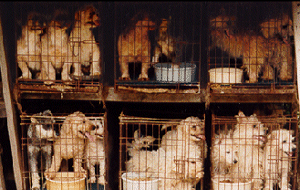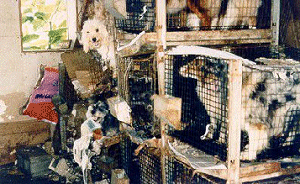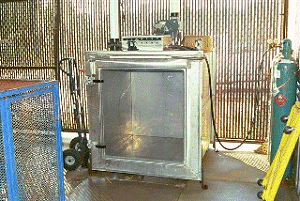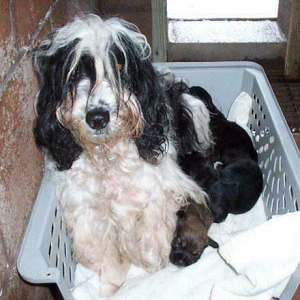
 Home Home
 Season's Greetings! Season's Greetings!
 The Economic Crisis: The Economic Crisis:
A Dog's Perspective
 About Those Hounds... About Those Hounds...
 Our Hounds Our Hounds
 Adopting a Friend Adopting a Friend
 Adoption Application Adoption Application
 Rescue of the Month Rescue of the Month
 Special Rescues Special Rescues
 The Bagel Shoppe The Bagel Shoppe
 The Old Age Page The Old Age Page
 Black Listed Beauties Black Listed Beauties
 Getting Involved - Volunteering Getting Involved - Volunteering
 The Ugly Truth The Ugly Truth
 Success Stories Success Stories
 Wishlist Wishlist
 The Homewoods Herald The Homewoods Herald
 Houndware Houndware
 Memorials Memorials
 Muchas Gracias Muchas Gracias
 Contact Contact

 Pryor's Planet Pryor's Planet
 Ritchie Co. Humane Society Ritchie Co. Humane Society
 Humane Society of North Central West Virginia Humane Society of North Central West Virginia
 Whimsical Animal Rescue Whimsical Animal Rescue
|
|

 Puppy Mills
Puppy Mills
Puppy mills are nothing new. These mass dog-breeding operations have been around for decades, but they continue to be a problem because unsuspecting consumers keep buying those adorable puppies in the pet store window. Or on some slick Internet site. Or even through an ad in the trusted local newspaper.
But behind the friendly fašade of these pet shops, web sites, and newspaper ads, there often lies a puppy mill. These canine breeding facilities frequently house dogs in shockingly poor conditions, particularly for "breeding stock" animals who are caged and continually bred for years, without human companionship and with little hope of ever becoming part of a family. After their fertility wanes, breeding animals are commonly killed, abandoned or sold to another mill. The annual result of all this breeding is hundreds of thousands of puppies, many with behavior and/or health problems.
The puppies will be shipped cross country by truck to be sold in pet shops, but many are also sold via newspaper classifieds or Internet
sites — and are often accompanied by false claims such as, "We'd never sell puppies from a puppy mill."
The Laws Aren't Enough
Because a puppy mill is a business, the facility is designed purely for profit, not comfort. Laws are on the books to provide minimum-care standards for puppy-mill animals, but enforcement has historically been spotty at best. The U.S. Department of Agriculture (USDA) licenses and inspects puppy mills for violations of the Animal Welfare Act; likewise, some state laws are designed to protect the charges in the average puppy mill. But puppy mills can successfully navigate around these laws, whether by selling directly to consumers (thereby avoiding USDA licensing requirements) or simply by avoiding the reach of law enforcement (with so few USDA inspectors and minor fines, it's easy to stay in business).
 HSUS Needs Your Help! HSUS Needs Your Help!
The Humane Society of the United States has been investigating puppy mills for decades, exposing the cruel realities of the commercial dog-breeding industry. They've lobbied for the current laws as well as for additional money to enforce those laws. They've also educated millions of consumers on the many reasons they should avoid pet-store puppies.
But their work is far from over. There are still thousands of puppy mills that need to be shut down for good. They need your help to do exactly that: Stop puppy mills.
Help The HSUS spread the word about puppy mills by ordering and distributing copies of their flier, "How to Find a Good Dog Breeder."
For more information on how you can help by supporting PAWS (Pet Animal Welfare Statute), please visit The Homewoods Herald and also check out prisonersofgreed.com.
Artlcle from http://www.stoppuppymills.org.
 The Gas Box The Gas Box
Many tax-funded animal shelters still use carbon monoxide gas chambers to kill unwanted cats and dogs. This method is considered by many to be outdated and inhumane and guess what?! Your taxes are funding it!
Animals in a gas chamber do not die quickly or painlessly. They struggle for breath. They claw to get out. This is not a pretty site and will stay with you for a very long time. When animals inhale carbon monoxide, they can suffer convulsions, vomiting, angina, and muscular spasms. Some will not die the first time. There is a better, more humane way -- euthanasia by injection. This method is cost effective and takes only seconds.
Shelter workers are at risk from carbon monoxide poisoning when they unload the gas chamber, breathing in low levels of the gas on a regular basis. This can lead to many health problems -- even death. The county is at risk of lawsuits from these workers if they become ill. Carbon monoxide is also extremely flammable, odorless, colorless, and difficult to detect.
The Humane Society of the United States, American Humane, American Veterinary Medical Association, National Animal Control Association, the American Society of Prevention of Cruelty to Animals, and the Association of Veterinarians for Animal Rights all advocate lethal injection of sodium pentobarbitol. It is considered the most humane, safest, and least stressful choice for euthanasia.
Killing with Kindness:
The Campaign for a Federal Law
for the Humane Euthanasia of Companion Animals
The Killing With Kindness Campaign demands one U.S. federal law: That all animal species housed in any shelter/pound/animal control facility shall be euthanized, only when necessary, by a veterinarian or trained, certified euthanasia technician, and that the animal shall first be sedated/tranquilized (when advisable) before being administered a lethal intravenous injection of sodium pentobarbital.
The idea for a federal law for the humane euthanasia of shelter animals began with an e-mail message written out of frustration by a rescuer and animal advocate who was tired of hearing the same horror stories about killing practices in some shelters and dog pounds. Numerous people from every background in rescue efforts and advocacy ("animal rights" and "animal welfare") responded and added their expertise and recommendations.
Despite the irony of the campaign name, it does not place a seal of approval on killing! From the start, nobody involved in this campaign approved of killing animals as a "solution" for America's surplus pet problem. We despise the killing and the reality is that despite all our individual efforts and those of national and international organizations, nobody has yet been able to accomplish more than reducing the number of companion animals killed. The horrible killing practices continue and will likely continue into the foreseeable future. We are all hopeful that our other efforts will someday change that situation. We hope the campaign will call attention to all the other factors that have led to the mass killing. It is already too late for the millions of companion animals who have died terrible deaths.
This is a grassroots campaign -- "your" campaign. Whether it lives or dies, whether companion animals die cruelly or compassionately, will depend on your involvement.
Please click here to get involved!
 Putting a Face Putting a Face
on the Gas Box
Melody was dumped roadside with her 3 little pups who were approximately 10 days old. She was found by a kindly animal control officer from the Lewis Upshur Dog Pound in West Virginia and although starving, she was unwilling to abandon her puppies.
Lewis Upshur Animal Control Facility is located in Upshur County and is not a humane society. Dogs come into the facility and have a five day grace period to find a forever home or are euthanized. If there is a collar with identification on it, they work tirelessly at finding its owner.
They are a rural shelter that has limited means to serve the duty that they are called to do for the area. They are committed to this end. Their intent then is finding temporary emergency foster homes for these dogs via rescue groups or individuals. This is done in a limited time frame and has nothing to do with the individual dog but rather where they are. Even the most wonderful dogs face death if they are at a shelter that has no room. This is the harshest of realities.
Melody was spirited up up and away by the heroic efforts of pound staff and transporters, overnighters and well wishers. She arrived at Homewoods stressed out but alive and ready to begin a new life. She is one of the lucky ones.
Please note: Melody is not currently available for adoption.
|

